

Purposeful_pathways_excerpt.pdf. Education 101: What is intentional learning? - Philadelphia Continuing Education. Students returning to college have internal motivation to succeed and achieve their education goals.
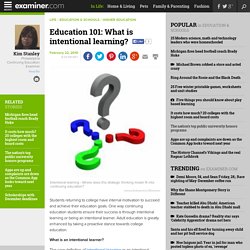
One way continuing education students ensure their success is through intentional learning or being an intentional learner. Adult education is greatly enhanced by taking a proactive stance towards college education. What is an intentional learner? The core definition of intentional learning or an intentional learner is the persistent and purposeful energy applied to the learning strategies and processes. This same energy can be applied to continuing education courses in college. “Three aspects of intentional learning are the (1) decision to engage in committed, persisted learning effort (self-motivation), (2) the ability to apply and manage strategic cognitive efforts to achieve goals (self-direction), and the (3) extent to which the learner takes responsibility for learning autonomously.
If You’re Going to Survey Students About Teachers, Do it Right. EdSurge Newsletters Receive weekly emails on edtech products, companies, and events that matter.
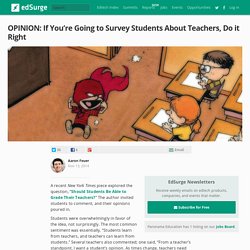
A recent New York Times piece explored the question, “Should Students Be Able to Grade Their Teachers?” The author invited students to comment, and their opinions poured in. Students were overwhelmingly in favor of the idea, not surprisingly. Increasing the Success of Online Students. Increasing the Success of Online Students By Ivan L.
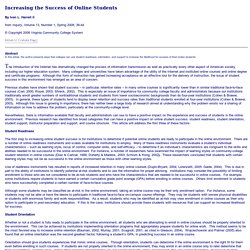
Harrell II from Inquiry, Volume 13, Number 1, Spring 2008, 36-44 © Copyright 2008 Virginia Community College System AbstractIn this article, the author presents ways that colleges can use student readiness, orientation, and support to increase the likelihood for success of their online students. The introduction of the Internet has dramatically changed the process of information transmission as well as practically every other aspect of American society, including our higher education system. JGoloboy_Top_10_Secrets.pdf. A brief examination of predictors of e-learning success for novice and expert learners. A brief examination of predictors of e-learning success for novice and expert learners Emily Stark, Andrea Lassiter, Ashley Kuemper Abstract.
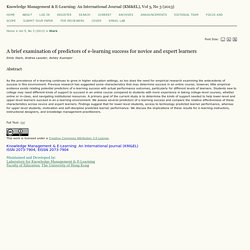
True Grit: The Best Measure of Success and How to Teach It. Can you predict academic success or whether a child will graduate?
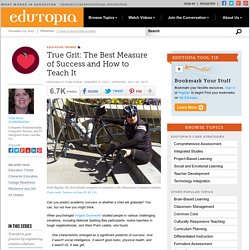
You can, but not how you might think. When psychologist Angela Duckworth studied people in various challenging situations, including National Spelling Bee participants, rookie teachers in tough neighborhoods, and West Point cadets, she found: One characteristic emerged as a significant predictor of success. And it wasn't social intelligence. It wasn't good looks, physical health, and it wasn't IQ. RioNews: Predictive Research Aims To Improve Student Success. Web sites like Pandora, Netflix and Amazon use data collection and analysis to predict the types of music and movies a user might enjoy or to offer relevant product suggestions to online shoppers.
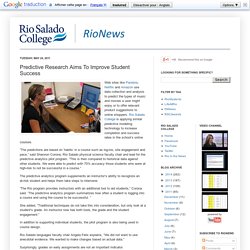
Rio Salado College is applying similar predictive modeling technology to increase completion and success rates in the school’s online courses. “The predictions are based on ‘habits’ in a course such as log-ins, site engagement and pace,” said Shannon Corona, Rio Salado physical science faculty chair and lead for the predictive analytics pilot program. “This is then compared to historical data against other students.
We were able to predict with 70% accuracy those students who were at high-risk to not be successful in a course.” The predictive analytics program supplements an instructor’s ability to recognize an at-risk student and helps them take steps to intervene. Page. Page. PSOL_OnlineReadiness_0811.pdf. Yukselturk.pdf. Improving online learning: Student perceptions of useful and challenging characteristics. <div class="msgBox" style="margin-top:10px;"><span class="errMsg"><div>JavaScript is disabled on your browser.
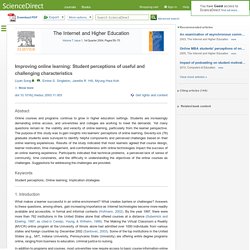
Please enable JavaScript to use all the features on this page. </div></span></div><br /> University of Georgia, 604 Aderhold Hall, Athens, GA 30602, USA Received 4 September 2003, Revised 3 November 2003, Accepted 4 November 2003, Available online 26 February 2004 doi:10.1016/j.iheduc.2003.11.003. 10.1.1.109.3649.pdf. Examing Social Presence in Online Courses in Relation to Students' Perceived Learning and Satisfaction. The Effects of Distance Education on K-12 Student Outcomes: A Meta-Analysis, Learning Point Associates / North Central Regional Educational Laboratory (NCREL), 2004-Oct. The community of K-12 education has seen explosive growth over the last decade in distance learning programs, defined as learning experiences in which students and instructors are separated by space and/or time.
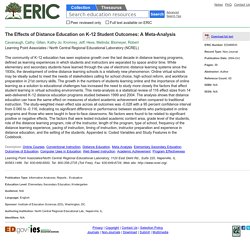
While elementary and secondary students have learned through the use of electronic distance learning systems since the 1930s, the development of online distance learning schools is a relatively new phenomenon. Online virtual schools may be ideally suited to meet the needs of stakeholders calling for school choice, high school reform, and workforce preparation in 21st century skills. Research and Practice in K-12 Online Learning: A Review of Open Access Literature. Cathy S.
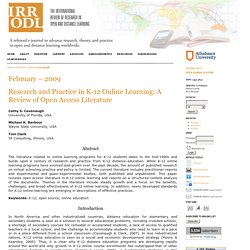
Cavanaugh University of Florida, USA Michael K. Barbour Wayne State University, USA Tom Clark TA Consulting, Illinois, USA. Online Drop Rates Revisited. Note: This article was originally published in The Technology Source ( as: David P.
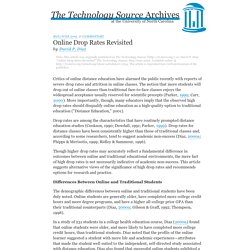
Diaz "Online Drop Rates Revisited" The Technology Source, May/June 2002. Available online at The article is reprinted here with permission of the publisher. Students’ Perceptions of Online Learning: A Comparative Study. Abstract In search of better, more cost effective ways to deliver instruction and training, universities and corporations have expanded their use of e-learning.
Although several studies suggest that online education and blended instruction (a “blend” of online and traditional approaches) can be as effective as traditional classroom models, few studies have focused on learner satisfaction with online instruction, particularly in the transition to online learning from traditional approaches. This study examines students’ perceptions of integrating online components in two undergraduate business courses where students completed online learning modules prior to class discussion.
The results indicate that participants in an elective course rated the online modules significantly better than those in a required course. Overall, participants in the elective course rated the online modules marginally positive while those in the required course rated them marginally negative. Citation. Evaluation of Evidence-Based Practices in Online Learning: A Meta-Analysis and Review of Online Learning Studies, US Department of Education, 2009-May. A systematic search of the research literature from 1996 through July 2008 identified more than a thousand empirical studies of online learning.
Analysts screened these studies to find those that (a) contrasted an online to a face-to-face condition, (b) measured student learning outcomes, (c) used a rigorous research design, and (d) provided adequate information to calculate an effect size. As a result of this screening, 51 independent effects were identified that could be subjected to meta-analysis. How Students Develop Online Learning Skills. Good Ideas More and more, adult learners are finding the convenience and flexibility of online learning a match for their learning goals and busy lifestyles. Online degree programs, courses, and virtual universities targeting adult learners have proliferated in the past decade.
Second-Level Digital Divide: Differences in People's Online Skills. Much of the existing literature on the digital divide - the differences between the "haves" and "have nots" regarding access to the Internet - limits its scope to a binary classification of technology use by only considering whether someone does or does not use the Internet. To remedy this shortcoming, in this paper I look at the differences in people's online skills. In order to measure online ability, I assigned search tasks to a random sample of Internet users from a suburban county in the United States. My findings suggest that people search for content in a myriad of ways and there is considerable difference in whether individuals are able to find various types of content on the Web and a large variance in how long it takes to complete online tasks.
What drives a successful e-Learning? An empirical investigation of the critical factors influencing learner satisfaction. E-learning is emerging as the new paradigm of modern education. Worldwide, the e-learning market has a growth rate of 35.6%, but failures exist. Little is known about why many users stop their online learning after their initial experience. Previous research done under different task environments has suggested a variety of factors affecting user satisfaction with e-Learning.
iNACOL_NationalPrimerV1_2007.pdf. Digital-course law changes schools’ lessons. LITTLE ROCK, ARK. — A new law requiring all high school students to take at least one digital course leaves the decision about what to offer up to school districts. The Arkansas Department of Education recommends that superintendents and principals give the same scrutiny to digital courses that they do any other course offered, said Debbie Jones, assistant commissioner of learning services for the department.
Jones recommends that courses also involve some face-to-face interaction, even if that interaction is through a Web camera. “We have posted suggestions,” Jones told the Arkansas Democrat-Gazette ( ). “It’s not required.” Computers are increasingly used in schools. Act 1280, passed in 2013, mandated public school districts and charter schools to offer at least one digital learning course this school year. Educators say high school students will need experience with digitally delivered courses because they likely will encounter them in college and in training programs for their jobs.
Arkansas « « Keeping Pace. Back to map. COMPLETE_Arkansas_Digital_Learning_Study_051914. Arkansas Revamps K–12 Distance Education Program. Arkansas is overhauling the way it delivers its K–12 distance learning courses, from live video conferences to a fully web-based model. For the past 10 years, students taking courses through Arkansas Distance Learning Services watched lectures and interacted with their teachers through a live, two-way feed using high-end video conferencing equipment.
EQM07110.pdf. Why do so many online students quit? EQM07110.pdf. The Future of Online Teaching and Learning in Higher Education: The Survey Says (EDUCAUSE Quarterly) Learner Support Services for Online Students: Scaffolding for success. Stacey Ludwig-hardman, Joanna C. Dunlap Abstract. Self-regulation in a web-based course: A case study. Student characteristics for online learning success. A Texas Wesleyan University, Department of Psychology, 1201 Wesleyan, Fort Worth, 76105, TX USAb Tarleton State University, Center for Instructional Technology and Distributed Education, Stephenville, 76402, TX USAc Texas Wesleyan University, Information and Communication Technology, Fort Worth, 76105, TX, USA.
Improving online learning: Student perceptions of useful and challenging characteristics. Evaluation of Evidence-Based Practices in Online Learning: A Meta-Analysis and Review of Online Learning Studies, US Department of Education, 2009-May. Students’ Perceptions of Online Learning: A Comparative Study. 10.1.1.109.3649.pdf.